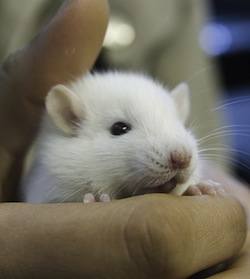
By lindastcyr
Animal testing goes on all over the world. It is a sad fact that many are trying to eradicate. In Britian, the use of animal testing for cosmetics has been banned since 2008 and now in 2011 the country is finally taking steps to ban animal testing for household products.
ght: 0px; padding-bottom: 0px; padding-left: 0px; border-top-width: 0px; border-right-width: 0px; border-bottom-width: 0px; border-left-width: 0px; border-style: initial; border-color: initial; font-weight: inherit; font-style: inherit; font-size: 1em; font-family: inherit; vertical-align: baseline; line-height: 1.5em; font: normal normal normal 1.1em/1.5em HelveticaNeue, Arial, Verdana, sans-serif; color: rgb(58, 58, 58); ” class=”rtecenter”>
According to the Daily Mail, animal testing for household products will be subject to the same rules that the cosmetic industry has to abide by. Lynne Featherstone, Home Office minister, said of the ban, “We believe it is possible to sell household products without inflicting pain and suffering on animals, and it is unacceptable that testing in this area continues.”
The big problem the UK and European nations have with a prohibition on animal testing for household products is the actual definition of “household products”. To help clarify Featherstone released a statement saying, “For the purposes of the proposed prohibition on testing of such products on animals we plan to apply the definition of “substances used in the household” used for reporting purposes in the Statistics of Scientific Procedures on Living Animals published annually. This includes all products that are primarily intended for use in the home, including detergents and other laundry products, household cleaners, air-fresheners, toilet blocks, polishes, paper products such as infant nappies, paints, glues (and removers), other furnishing and DIY products and household pesticides.”
It is a pretty good start to eradicating a sizable portion of animal testing that goes on in the UK. According to the BBC, “Research from 2004 stated that in the UK, universities perform most experiments, which accounts to about 40% of animal testing. Next is followed by commercial companies at 37%, charities at 6% and Government departments at 5%.”
Commercial companies are the ones testing products like detergents, air fresheners, paints, polishers and all manner of household products on animals.
The British Union for the Abolition of Vivisection (BUAV), an organization dedicated to ending all animal testing, released a statement giving the move a lukewarm welcome, “The BUAV has today welcomed the Government’s reaffirmation of its intention to ban testing on animals for household products, although we are concerned by the continued uncertainty about which products will be covered and the absence of a firm date to implement the ban. It is unacceptable for animals to continue to suffer and die for a new washing up liquid or air freshener.”
BUAV keeps a current list of cruelty free products, organizations and companies that have the leaping bunny logo. Products with the leaping bunny have not been tested on animals at all during any phase of production. Hopefully, if the UK implements the bans quickly, BUAV’s cruelty-free list of products will grow larger.
Article courtesy of ecorazzi.com

